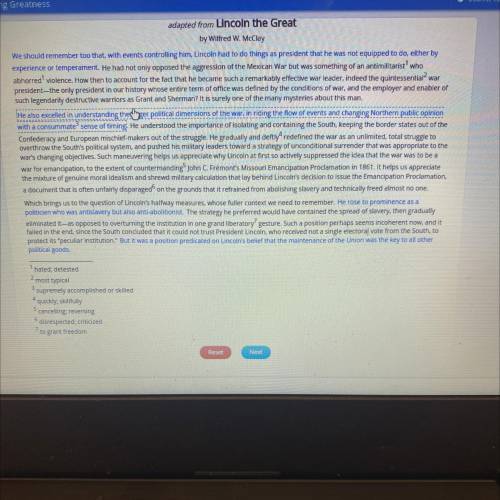Adapted from Lincoln the Great
by Wilfred W. McClay
We should remember too that, with events...

English, 20.10.2021 09:20 aaburto1515
Adapted from Lincoln the Great
by Wilfred W. McClay
We should remember too that, with events controlling him, Lincoln had to do things as president that he was not equipped to do, either by
experience or temperament. He had not only opposed the aggression of the Mexican War but was something of an antimilitarist' who
abhorred' violence. How then to account for the fact that he became such a remarkably effective war leader, indeed the quintessential war
president-the only president in our history whose entire term of office was defined by the conditions of war, and the employer and enabler of
such legendarily destructive warriors as Grant and Sherman? It is surely one of the many mysteries about this man.
He also excelled in understanding the larger political dimensions of the war, in riding the flow of events and changing Northern public opinion
with a consummate sense of timing. He understood the importance of isolating and containing the South, keeping the border states out of the
Confederacy and European mischief-makers out of the struggle. He gradually and deftly redefined the war as an unlimited, total struggle to
overthrow the South's political system, and pushed his military leaders toward a strategy of unconditional surrender that was appropriate to the
war's changing objectives. Such maneuvering helps us appreciate why Lincoln at first so actively suppressed the idea that the war was to be a
war for emancipation, to the extent of countermanding John C. Fremont's Missouri Emancipation Proclamation in 1861. It helps us appreciate
the mixture of genuine moral idealism and shrewd military calculation that lay behind Lincoln's decision to issue the Emancipation Proclamation,
a document that is often unfairly disparaged on the grounds that it refrained from abolishing slavery and technically freed almost no one.
Which brings us to the question of Lincoln's halfway measures, whose fuller context we need to remember. He rose to prominence as a
politician who was antislavery but also anti-abolitionist. The strategy he preferred would have contained the spread of slavery, then gradually
eliminated it-as opposed to overturning the institution in one grand liberatory' gesture. Such a position perhaps seems incoherent now, and it
failed in the end, since the South concluded that it could not trust President Lincoln, who received not a single electoral vote from the South, to
protect its "peculiar institution. But it was a position predicated on Lincoln's belief that the maintenance of the Union was the key to all other
political goods.
hated; detested
2 most typical
supremely accomplished or skilled
4 quickly, skillfully
5 cancelling reversing
disrespected, criticized


Answers: 2


Another question on English

English, 21.06.2019 13:00
4. which of the following issues would you look for in the editing stage of writing? incorrect punctuation incorrect format incorrect capitalization lack of transitions subject-verb agreement
Answers: 2

English, 21.06.2019 19:30
Frankenstein: what attitudes toward education are expressed by shelley in her description of victor’s upbringing in chapter 1? what, for example, motivates victor and elizabeth to study/practice?
Answers: 1

English, 22.06.2019 06:40
Read these lines from stanza 5 of the poem, “they shot wook kim” and answe the question. hung in the air/over that petroleum morgue that night. what does the use of the phrase “petroleum morgue” best suggest? an atmosphere of chemical detachment an unsettling place of ultimate rest a dark street containing a lifeless body an area containing putrid substances and smells
Answers: 3

English, 22.06.2019 07:30
Arrange the events below in chronological order. claudius and polonius hide themselves and listen in on hamlet's conversation with ophelia. claudius decides that hamlet's madness is not caused by neglected love and that he is dangerous. rosencrantz and guildenstern tell claudius that they still do not know the cause of hamlet's behavior. polonius suggests that he will hide and listen as the queen talks with hamlet.
Answers: 1
You know the right answer?
Questions









Mathematics, 04.11.2020 19:00






Biology, 04.11.2020 19:00








